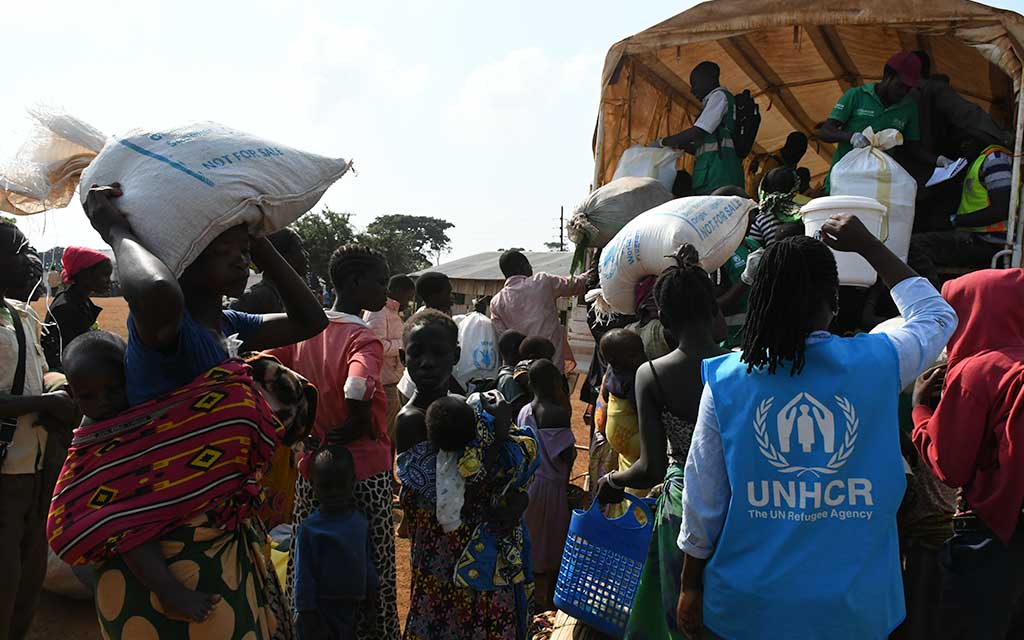Democratic Republic of the Congo emergency
Jolie was forced to flee Kishishe in the eastern Democratic Republic of the Congo (DRC) due to fighting between non-state armed groups and government forces.
Refugees like Moses have been driven from their homes by attacks, arson and killings. Please help them survive and start to put the past behind them.

Shelter
for those who fled with nothing.

Cash Assistance
to pay for food and other life-saving essentials

Protection
of vulnerable women and children.
What’s happening in the DRC?
Intensifying violence and conflict in the eastern Democratic Republic of the Congo means families are fleeing every day. There are now 7.2 million people displaced in the country, with many in desperate need of food and shelter. This latest wave of violence is the most recent to hit a country that has experienced humanitarian emergencies and insecurity in recent times.
Alongside the violence and conflict, the DRC continues to experience the impact of devastating flooding, which has damaged or destroyed some 100,000 houses, 1,325 schools, 267 health facilities and large swathes of agricultural land. Two million people – nearly 60 per cent of whom are children – are in need of assistance.
UNHCR is providing shelter materials and cash grants to displaced families, as well as strengthening the protection of the most vulnerable, but additional support is desperately needed.
What’s happening in the eastern DRC?
Escalating conflict is driving record levels of gender-based violence, displacement and hunger in the east of the Democratic Republic of Congo. The country is on the brink of catastrophe and urgent international action is required.
UNHCR is part of the large-scale response to internal displacement in eastern DRC. It works closely with partners and other stakeholders to provide lifesaving protection, shelter, non-food items and camp coordination services to internally displaced people.
What’s causing the violence in the DRC?
The humanitarian emergency in the DRC is one of the most complex crises in the world. The challenges of the past three decades have included deadly confrontations between armed groups and rampant violence.
The situation worsened in 2023, as conflict escalated in the eastern provinces of North Kivu, South Kivu and Ituri, with widespread human rights violations and an exponential rise in incidents of gender-based violence. Traditionally safe areas of the country also saw an increase in instability.
Where are families fleeing?
Throughout 2023, many more families joined over one million refugees and asylum-seekers from the DRC hosted in 22 countries across Africa. Around 54,000 people arrived in Burundi, Rwanda, Uganda and the United Republic of Tanzania. By the end of 2023, those four countries were home to 760,000 refugees from the DRC.
What happens when people return home?
Returning families often find their property, businesses and schools in ruins – and many members of the community dead. Human rights violations are still widespread, including physical mutilation, killings, sexual violence, arbitrary arrest and detention in inhumane conditions.
Why do we urgently need public support?
At the moment, UNHCR has less than a quarter of the funds we need to provide lifesaving assistance and protection to refugees and people displaced in the DRC. It’s simply not enough to cope with the scale of the crisis – and we urgently need your support.
Where can I find more data, maps and reports?
Congolese Situation – for latest updates on the crisis overall, including UNHCR situation reports, funding requirements and UNHCR’s support for countries taking in refugees from the DRC.
DRC Operations – UNHCR’s relief work for displaced people inside the DRC.
Did you know that in 2018, UNHCR tracing programmes helped reunite half of all internally displaced Congolese with lost family members?

Many of these families escaped the DRC with nothing but what they could carry.
They travelled for miles and suffered so much before reaching the safety of the Kyangwali refugee camp in Uganda.
Although their troubles are far from over, they now have shelter, protection and support from UNHCR to help them survive the months ahead.
Photo: ©UNHCR/Duniya Aslam Khan


